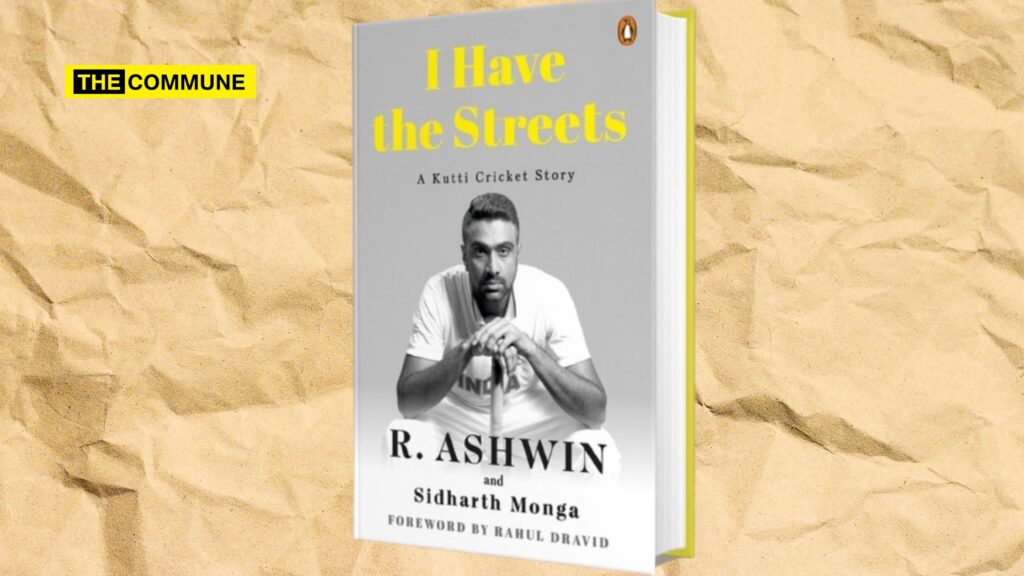When I heard about R Ashwin’s retirement from International Cricket, I instinctively picked up his book “I Have the Streets: A Kutti Cricket Story” instinctively. Known to be a very erudite, thinking cricketer, his retirement came as a complete shocker. It evoked an instantaneous desire to delve into the mind and life of this special cricketer. This book is all about Cricket, Life, and more Cricket. When one reads this book, it is unsurprising that Ashwin has achieved the high echelons of success and etched a name for himself in the annals of Indian and World Cricket history.
The foreword by the legend Rahul Dravid is beautifully penned in “I Have the Streets: A Kutti Cricket Story”. He describes this book as a Cricketing book and a Children’s book. I was perplexed at the use of the term ‘Children’s book, which became apparent towards the end.
Written in straightforward, conversational English, the reader is transported to the bylanes of Madras, where Ashwin starts to hone his skills. One of the book’s most endearing and beautiful aspects is the use of traditional words like Amma, Appa, and Thatha throughout “I Have the Streets: A Kutti Cricket Story”.
Like every middle-class family, Ashwin’s success has a huge string of sacrifices by his family. The roles played by each of his parents and grandfather are so beautifully described that one can’t help but smile at the elusive success and feel the pain of failures at other junctures. Ashwin’s school journey overlaps with many contemporaries who make their mark in domestic and international cricket. A special mention has to be made about Aniruddha Srikanth, whose relationship with Ashwin is sometimes quite amusing.
Ashwin is credited with being a thinking cricketer, and this book provides ample insight into the making of one. When medically down, Ashwin became a left-handed batsman to beat boredom. The book describes the rich and age-old tradition of tennis ball cricket integral to every kid’s life in India. Ashwin’s success and journey through the school cricket scene and transition to club cricket are equally interesting and quite revealing at times. A glimmer of the future is revealed with Ashwin rubbing shoulders with Rohit Sharma & Cheteshwar Pujara in U17 selection trials and Jadeja in the U-19 setup.
Ashwin was originally a batsman who transitioned to become a bowler and off-spinner at one. The trigger to this transition is a casual comment from his Amma. Considering Dinesh Karthik as his hero, Ashwin’s journey under C. K Vijaykumar and Vasu as coaches/mentors shape his initial journey with each predicting his eventual rise to stardom. However, it is the tutelage under W. V. Raman that shapes Ashwin to transcend from a good talent to the eventual greatness he would go on to achieve. Some of the advice is ageless, timeless wisdom: “Be fully immersed in the activity that you are engaged in”, “If the ego kicks in, I will kick you”.
The book is also a very good window into Ashwin’s personality. Being outspoken to the extent of rubbing the powers in the wrong way to having an ever-inquisitive brain to continue innovating, this book doesn’t provide a glossy picture of the man that he is. This book provides perhaps a more relatable, true human that he is with all his so-perceived imperfections. Ashwin is neither overawed by stars (but believes in carving his own identity) nor backs down from working on his inadequacies. His challenges with his own weight and fielding, especially the work with Gary Kirsten and Paddy Upton, are quite inspirational. Ashwin comes across as a constantly thinking, evolving mind – something that many of his contemporaries and commentators have spoken about.
Ashwin’s special relationship with MSD forms a good portion of his IPL and Indian journey. It is quite interesting to read the insights or ringside view into MSD’s mind and what goes on in the same. MSD employing the age-old management concept of Pygmalion is one of the highlights of the book. One shouldn’t miss the special episode on Sreesanth. Ashwin does speak very highly about Gautam Gambhir as his captain. Personally, I wonder if the perception would remain the same now.
Beyond cricket, Ashwin provides ample view into friendships and relationships. A Kutti love story is blossoming in the book. The book ends with the high of the 2011 World Cup win as well as CSK’s first title in 2010. As the book was published in 2024, I am surprised by the conclusion of the book with the events of more than a decade back.
Hence, I feel this is a children’s book as it captures Ashwin’s childhood journey and his initial rise to stardom. It also captures the beautiful family relationships and his journey with Prithi. I am sure there’s much more to his life, especially his journey outside CSK, his stupendous success in Test Cricket, and his phase of life beyond cricket.
There’s a lot more to come about Ashwin. I presume this is just the beginning. As the famous saying goes “A journey of a thousand miles starts with a single step”. This book is definitely the first step into understanding the life and mind of Ravichandran Ashwin.
Brilliantly written. Highly recommended read.
Gee Vee is an engineer and avid fan of itihasas, puranas and books.
Subscribe to our Telegram, WhatsApp, and Instagram channels and get the best stories of the day delivered instantly.

